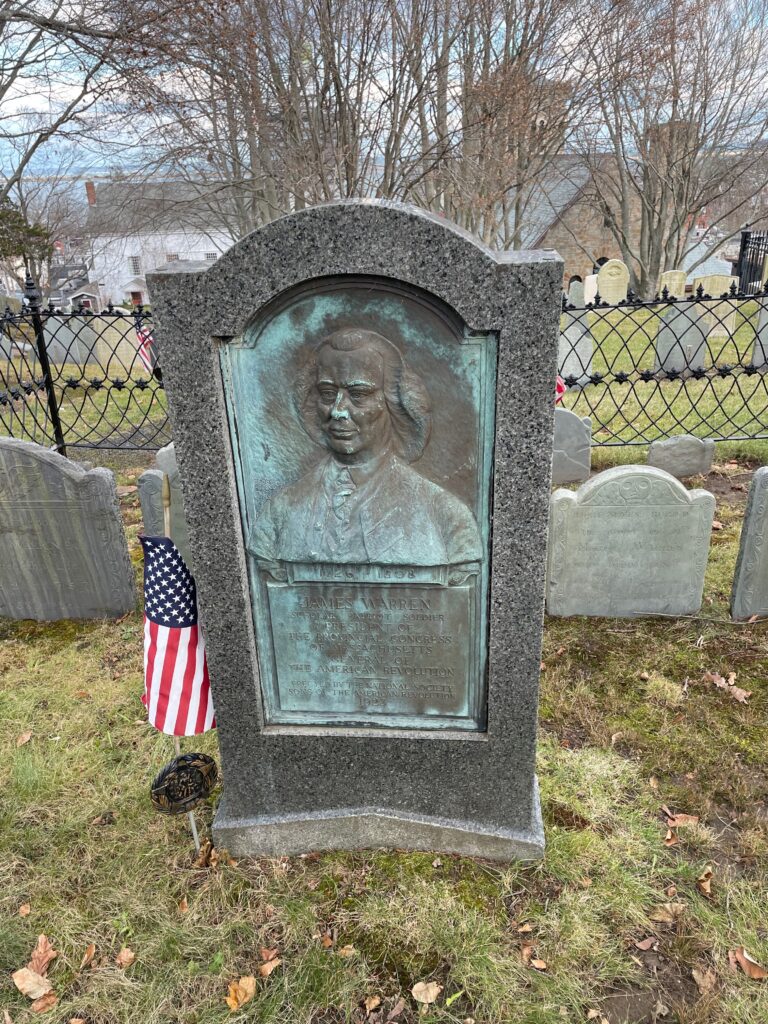Erik Visits an American Grave, Part 1,696
This is the grave of James Warren.

Born in 1726 in Plymouth, Massachusetts into what passed for the Puritan elite of the time. But even the elite were pretty much working on little farms. He went to Harvard beginning in 1742 and finished in 1745. He already had become interested in reforming colonial governance. He went back to Plymouth, started his own farm and also became a merchant. He started a courtship of Mercy Otis but it took six years for her father to approve and they married in 1754. In 1757, Warren’s father died and in this era positions like high sheriff were inherited and so Warren took it over.
Warren was an early convert to the idea that the colonies should be independent or at least more self-governing, so it wasn’t surprising that when Parliament passed the Stamp Act in 1765, he became a leader in resisting it. Based on that, Warren was elected to the colonial legislature in 1766 and he remained there until 1778. As such, he was right there with John Adams, Samuel Adams, and John Hancock as leaders of the Massachusetts resistance. It’s interesting to me that Warren is largely forgotten today compared to those guys, but I guess he didn’t have a giant signature or became president. In fact, Mercy is better remembered today, in part because of the more recent emphasis to center women in our early history, which completely makes sense. In fact, from what I can tell, almost all recent historical literature on the family focuses on Mercy. Of course she was a fantastic propagandist, so I don’t mean to say this fact as a negative thing. It’s just an observation.
After Joseph Warren (evidently, not related) was killed in battle in 1775, James Warren took over as President of the Massachusetts Provincial Congress and did that until 1780. He was Paymaster General for the Continental Army (now there was a thankless task!) and was on the Naval Board for the Continental Navy for most of the war. He was in the militia for one year in 1777, but he quickly realized that he could help the Revolution in better ways.
The aftermath of the American Revolution was difficult for Warren for the simple reason that his ideas about proper governance were very different than most of the Massachusetts elites. He was elected to as Speaker of the state legislature in 1787, yes. But that was an exception. For example, he was a big supporter of Shays’ Rebellion. He really wanted an America that was ideologically republican, even more than a Jefferson did, for instance. Meanwhile, his old New England allies wanted to crush those farmers. This position really did impact Warren. He was a founder of the American Academy of Arts and Sciences with many of his fellow elites, but they mostly turned on him hard over Shays’ Rebellion. These rich guys really hated the idea of poor farmers taking their rhetoric seriously unless they controlled them. Then, Warren became a big anti-Federalist, believing that the Constitution, without a solid Bill of Rights, should not be ratified. As John Quincy Adams wrote of Warren, in lines he could have later written about himself, he “was formerly a very popular man, but of late years he has thought himself neglected by the people. His mind has been soured, and he became discontented and querulous.” It got worse. His son Winslow had applied to be the American consul in Lisbon. But the new government rejected him based on the belief that not only had Warren supported Shays’ Rebellion, but that Winslow had actively participated in it (which may be true). That led James and Mercy to write a letter to the governor of Massachusetts, lambasting him for tanking Winslow’s candidacy.
In 1794, Warren decided to leave politics, after being defeated in a run for lieutenant governor of Massachusetts. He was always a little more reticent than other Founding Fathers to spend his entire life in politics. This probably actually why he is less known than most of the other major American Revolution leaders. Most of those guys loved to say that they were like Cincinnatus, wanting to be on the farm but reluctantly agreeing to serve, but they were full of shit. They loved it! But Warren? Not really, he simply wasn’t that ambitious in that way. He remained a huge Jefferson guy and was an elector for him in 1804, in a rare return to politics, again gaining the contempt of most of the Massachusetts elite.
Warren died in 1808, at the age of 82. In the aftermath, Mercy reached out to John Adams to try and repair relations and that was the moment in which Adams started softening on his hatred of Jefferson too. I guess as these guys started dying, the survivors began to realize that this was all a long time ago now.
James Warren is buried in Burial Hill, Plymouth, Massachusetts.
If you would like this series to visit other members of the American Revolutionary generation (and I hate Warren Harding for many reasons, but introducing “Founding Fathers” into our lexicon is one of them because it is such a well turned phrase and thus is hard not to use), you can donate to cover the required expenses here. Patrick Henry is in Red Hill, Virginia and Richard Henry Lee is in Coles Point, Virginia. Previous posts in this series are archived here and here.


